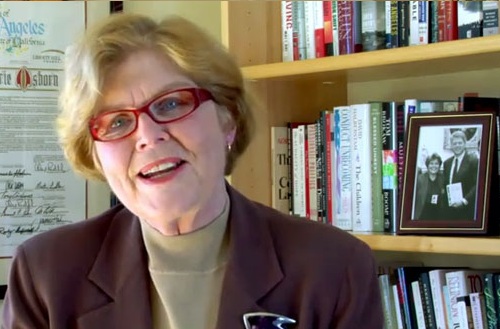Are Parties Still Relevant? A Look at Torie Osborn's Grassroots Campaign in California AD-50

The contentious and expensive race in California Assembly District 50 has pitted two progressive Democrats against each other. Assembly member Betsy Butler, who currently represents the 53rd district, but is running for the open seat in AD-50 after the district lines were redrawn; and LGBT rights activist, Torie Osborn, who has run an energized outsider campaign on lots of small donations and substantial grassroots support.
Most of the commentary on this race has focused on the candidates themselves and the war of words between each campaign's supporters, with Torie Osborn's supporters charging that her opponent is a Sacramento-endorsed, establishment candidate while Osborn is a true progressive with genuine, grassroots, community support. Betsy Butler's supporters have fired back that her record proves she is also a true progressive and that Osborn's campaigning has been too negative and disingenuous.
Whichever the case may be-- and ultimately it is up to voters to decide-- there is a much bigger story here: that Torie Osborn's undeniable grassroots success is making the entire political party system less relevant and less powerful.
It is true that Betsy Butler has the support and funding of the Democratic Party establishment, not the least of which comes from California Speaker of the Assembly John Pérez, who's backing his assembly colleague in this race. The donations also tell a story of massive grassroots support for Osborn and establishment support for Butler:
According to recent fundraising reports filed with the California Secretary of State, Osborn has raised $803,753 from 3,626 individual donations. Sixty-eight percent (68%) of the donations were $100 or less, considered a sign of grassroots support and ability to mobilize new voters into the political process.Osborn dwarfs Butler in those small individual donations. Osborn has received 2,481 small donations, while Butler pulled in a mere 123 such donations. In another indication of broad grassroots support, 1,488 donations were made online to Osborn's campaign, totaling $251,503, vs. 119 to Butler for $41,285.Butler, a lawmaker who represents the South Bay and moved to Beverly Hills to run for this seat, trailed Osborn miserably in raising local money and showing support from the 50th District. Osborn raked in 1,658 contributions, totaling $403,430 from the new district. Butler drew less than ten percent of that - 107 contributions totaling $59,463...Torie Osborn has received 9 contributions from Sacramento totaling $8,625. Betsy Butler has received 142 contributions just from Sacramento that come to $291,044.
Again, it will be up to voters to decide how this reflects on the true character and qualifications of each candidate for the seat, but the fact remains that Butler's candidacy is heavily-backed by the state Democratic Party while Osborn's campaign has been a major success without institutional support, relying instead on local grassroots support-- including, for instance, the endorsements of eleven local Democratic clubs in the new Assembly district.
Even though Osborn is a registered Democrat and running for the seat as a Democrat, she is rallying the support of voters in AD-50 without the endorsement or funding of the state party. If she doesn't have either of those things, then for all practical purposes, she's an independent candidate. If she's one of the top two finishers after Tuesday's primary, along with fellow Democrat Betsy Butler, the voters of AD-50 will essentially have a choice in November between a Democrat and an independent.
If a candidate can succeed in an election without their party's endorsement or money, what's the point of the party? Is it much more than a letter next to a candidate's name? If the candidate is chosen by voters over the party's pick and despite the party's opposition, then seriously what's the point of the party? How does a party remain relevant, legitimate, or credible in such a scenario? Furthermore, could AD-50 be an indication that party support and the incumbent "advantage" are actually liabilities for candidates in today's political climate of voter disillusionment with the status quo?
If so, the future looks very bright for independent candidates and very gloomy for the two major political parties in this country.




